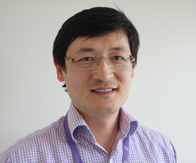Interview - Dr Oleg Kiriaev

1. Can you please describe your typical day?
I am able to work part time in the hospice so it offers great flexibility. We usually have a triage meeting first and then my day is spent supporting the team as well as the community in their usual clinical activities. This could any thing from talking with hospital doctors or GPs and giving advice to doing home visits or seeing patients at the hospice either as an inpatient or outpatient. A good amount of time is available for educational activities which is strongly encouraged and supported.
2. What are the types of cases you typically see?
We usually see the more complex cases as the general services do a great job in managing the palliative care needs of most of their population with advisory support from us. The complexities can be legion in nature and vary from difficult symptom control through to precarious social circumstances, emotional and psychological issues as well as spiritual and existential crises.
Essentially any cause for suffering that has not been addressed or relieved through usual channels would be of interest to us. This makes the job very challenging but also provides it with its greatest reward as it reminds us to always ensure the focus remains on making a positive impact for a person and their family/whanau's life.
Also death is the greatest leveler in society. We see people coming from all walks of life respond to death in a multitude of ways. It thus becomes vitally important to know where a person has come from and their story in order to be in the best position to help them.
3. What do you like about working in Palliative Medicine and about working in the Auckland Region?
Working in Auckland is great as the size of the region is such that there are many great initiatives and projects being undertaken by different teams. Hearing about them, collaborating and sharing these experiences offers an additional reward to your daily work activites and by keeping things interesting and constantly changing.
4. How many teaching hours do you provide to your RMOs each week?
We don't have House Surgeons working at the hospice and have one post for Registrars interested or training in palliative care.
5. What opportunities are there for RMO professional development?
Palliative care as a specialty recognizes the importance of innovation and professional leadership and activity promotes these qualities amongst those training in this field. As a specialist, having the skills to recognize the opportunities that exist in the community and developing a holistic service that responds to these needs is hugely satisfying. As hospices tend to be relatively small nimble organizations, achieving these changes is less difficult. Currently there is a great shortage of trainees coming through the system so once through, there is plenty of scope and flexibility to tailor your career according to your own needs and preferences.
6. What interested you about this specialty?
My interest developed when I first worked in a community team as part of my training. I realised a lot of our practice and the health system as a whole often gets side tracked from what really matters. We all get taught the patient centered model of care and understand the important benefits that comes with this approach. All too often however, work obligations, different agenda and priorities, barriers and attitudes act to lessen our ability to provide the best care we can. I think working in Palliative and Hospice Care has helped me to practice and provide care that is truly patient centered and values based. At its core, the specialty is defined by the priority it gives to relieving suffering and challenging stereotypes and stigmatization especially amongst minority or less visible groups in our community.
7. What do you enjoy doing in your spare time for leisure activities?
Anything other than thinking about work. This may sound facetious but there is a core truth in the importance of maintaining separation between work and private life. All too often work intrudes on way we feel about ourselves and live. The great thing about training in Palliative Care is that it actively encourages you to realize and achieve this balance by introducing you with the resources and guidance that you'll need to maintain self-care both now as well as for the entire duration of your career.
- Anaesthesia
- Emergency Medicine
- General Practitioners
- Intensive Care Medicine
- Medicine
- Obstetrics and Gynaecology
- Ophthalmology
- Oral Health
- Paediatric Medicine
- Palliative Medicine
- Pathology
- Psychiatry
- Public Health
- Radiology
- Radiation Oncology
- Rehabilitation Medicine
- Sexual Health
- Surgery and Surgical Specialities
- Dermatology
+64 9 631 0707
More contact details: Address RMO Recruitment Contacts
Postal Address
Health New Zealand | Te Whatu OraWorkforce Operations Northern
PO Box 112147,
Auckland 1642, New Zealand
Physical Address
Health New Zealand | Te Whatu OraWorkforce Operations Northern
James Fletcher House, Level 3
Connect Business Park
581-585 Great South Road
Penrose, Auckland 1061
